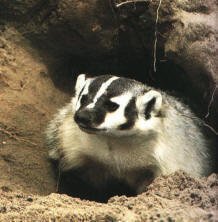|
Taxidea Taxus
is polygynous, which means they have more than one mate. In the
wild, the males have large ranges (up to 2.4 square kilometers)
while there may be multiple females in that same area. This is
because the females have smaller ranges of about 1.6 square
kilometers, which may overlap each other as well.
Badgers will
mate between July and August. The females will go off and make a den
with a nest made of dry bedding material. The implantation of the
fertilized egg is delayed until late January and early February.
Then the embryo will grow for about 6 weeks. The babies are born
sometime in March.
The mother
will have one to five babies at a time. The young are taken care of
by the mother until they are weaned in about June. The adolescent
badgers will go and seek out their own home ranges.
|